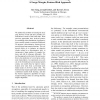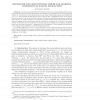167 search results - page 12 / 34 » Learning words from sights and sounds: a computational model |
126
click to vote
AAAI
2010
15 years 3 months ago
2010
Recent research has shown that surprisingly rich models of human behavior can be learned from GPS (positional) data. However, most research to date has concentrated on modeling si...
121
click to vote
ACL
2012
13 years 4 months ago
2012
We address the problem of learning the mapping between words and their possible pronunciations in terms of sub-word units. Most previous approaches have involved generative modeli...
93
Voted
ICPR
2008
IEEE
15 years 8 months ago
2008
IEEE
This paper presents a subject-independent EEG (Electroencephalogram) classification technique and its application to a P300-based word speller. Due to EEG variations across subje...
122
click to vote
STOC
1993
ACM
15 years 6 months ago
1993
ACM
Abstract. It is shown that high-order feedforward neural nets of constant depth with piecewisepolynomial activation functions and arbitrary real weights can be simulated for Boolea...
125
Voted
IJCAI
2007
15 years 3 months ago
2007
Computing semantic relatedness of natural language texts requires access to vast amounts of common-sense and domain-specific world knowledge. We propose Explicit Semantic Analysi...


